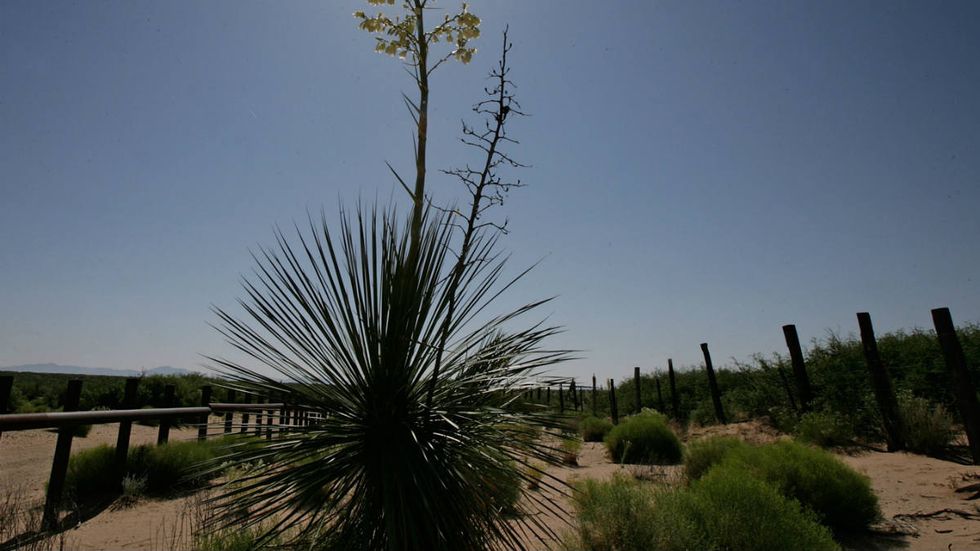
© 2025 Blaze Media LLC. All rights reserved.
What happens when illegal aliens and Mexican cartels shut down our government?
February 13, 2019
Why is it that the media and politicians are terrorized at the prospect of a partial government shutdown at the end of the week? Presumably, because they fear certain nonessential functions of government will halt and eventually some essential functions could be slowed down as well. But why is there no concern when brutal Mexican cartels are able to shut down basic services in border counties with waves of hundreds of impoverished and sick migrants, strain their social services, and fleece the pocketbooks of American taxpayers? Isn’t that the shutdown we should be addressing?
Hidalgo County, which fills out the bootheel of New Mexico, has four sheriff’s deputies, seven emergency medical services personnel, a small health clinic in Lordsburg, and a few volunteer EMTs who provide health care out of their homes or in clinics in rancher villages like Animas. It might seem like subpar infrastructure for health and public safety, but it is enough for 5,000 peaceful citizens used to living a life of rugged individualism. However, what happens when cartels target that county for an invasion of at least 28 groups of 100-400 volatile migrants at a time within a period of four months? What happens to their services then? You might call it a government shutdown.
It's bad enough when such a volume of illegal immigration is driven into more built-up counties along the border with greater infrastructure, such as Yuma County, Arizona. In southwest Arizona, there is a city right at the international port of entry in San Luis with a substantial CBP headquarters to process the illegal immigrants. Yet it’s still a strain on the local counties. As Yuma County Sheriff Leon Wilmot said on my podcast last month, the migration just in Yuma is costing about $1.2 billion. He noted that “the Border Patrol has to buy diapers, feminine hygiene, hot meals, etc.” and “have essentially turned into a bed and breakfast and transportation hub for the cartels to further their criminal enterprise.”
While most of this cost is eaten by federal taxpayers, it also strains the local government. “Just last year alone, the Border Patrol took 1,700 illegal immigrants to our local hospital, which took about 10,000 Border Patrol man-hours off the field, and it cost us taxpayers $700,000 in medical bills,” said the sheriff.
Now picture Hidalgo County, New Mexico, with 5,000 people in 4,200 square miles with not a single village, never mind a town, anywhere in the southern part of the county, and a tiny CBP headquarters at a border crossing that has nothing but a single building with no city around it. Antelope Wells point of entry was originally manned by a single agent and saw, on average, four vehicles per day pass through the checkpoint. The main CBP headquarters, which in itself is not big, is a 90-minute drive northwest in Lordsburg. The nearest hospital is roughly the same distance northeast in Deming, which is in neighboring Luna County. The Deming hospital itself only has a few physicians on staff now treating all these illegal migrants.
This is why an invasion of thousands of migrants is so devastating to this particular county. As migrants come in with influenza, scabies, flesh-eating bacteria, and all sorts of sicknesses, not only has the Border Patrol been commandeered into an EMT service, as it has been in all border sectors, the paltry services of Hidalgo and surrounding counties are marshalled into this free service for illegal aliens as well.
I spoke with David Whipple, the head of the seven-man EMS team in Lordsburg, the Hidalgo County seat, and he told me that while CBP has stepped up in recent weeks to provide its own EMTs, his tiny ambulance service has had to drive all the way down to the border, pick up sick migrants together with at least two border agents at a time, and drive them to the hospital in Deming and then back again.
“That is a six-hour trip, so it takes one crew and ambulance out of service for six hours for just one patient. That definitely strains us because we have a crew gone for so long. … We might only leave two people in our service area during these trips.”
Hidalgo County can bill Border Patrol for the cost, but the feds don’t pay back in a timely fashion. This small service is owed between $40,000 and $50,000, according to Whipple. But the lost time that endangers county residents who pay taxes can never be paid back. “We can take care of our own with limited staff; we have the same staff now as we had back when I started 30 years ago, and we did fine until this hit. We might have to add more EMS staff in the future if this doesn’t let up.”
Joel Edwards, a retired teacher in Hidalgo who now serves as one of the three county commissioners, expressed his frustration with the lack of resources and attention to the plight of his county. “The clinics try to squeeze everyone in, including the migrants coming with border agents. Nobody is being turned away, so they are doubling and tripling up during the same appointment times and some of our residents are getting irritated for having longer wait periods and less time with the physician.”
Even more disturbing is the fact that for those illegal immigrants who aren’t as severely sick, Border Patrol will often take them to the tiny clinics in Lordsburg (pop. 2,500) and Animas (pop. 237). The facility in Lordsburg has two physicians, and the one in Animas has one nurse practitioner. Local citizens have to wait in line while those who violate our sovereignty get served for free and expose the staff to diseases that we thought were long eradicated.
“We would like to think that we have a safe environment; we’ve vaccinated our kids and eradicated many of these diseases we’ve stopped worrying about,” said Edwards. “Now our population is subjected to having to rub elbows with people who have various diseases, and some of these diseases, we don’t know what they are. Just like with the drugs, we are worried about the safety of our residents.”
Edwards also discussed concerns about the lack of local law enforcement to deal with the cartel activity threatening the ranchers at the border. “Some people think that these ranchers down on the border are a bunch of whiners, but I’m here to tell you they are tough people. They are not used to having to ask for stuff; they are self-sufficient. All they want is an opportunity to ranch and farm their land in a safe manner.”
Edwards confirmed that the ranchers are calling for barriers that will effectively “restrict this illegal traffic coming across with drugs and human smuggling.”
“When you head towards Hachita, the fence disappears and there’s nothing but a barbed-wire barrier. I can walk through that fence without it even slowing me down. There are places where you can just walk under the fence.”
Edwards noted that the low wired fences are even worse than the Normandy barriers because they can’t even fully stop vehicle traffic. “There are places where they simply take the ties off of the barbed wire as it goes onto the ‘T’ posts. They undo the ties and hold the wire down, standing on it, while someone else drives a vehicle over it. After they cross, they turn it loose and put the wire back, so you can’t even tell without close inspection that they took the wires off the post.”
“I’ve heard this all from the ranchers. … We are a real soft spot at the border.”
This the most basic shutdown of the federal and local government, and it’s being done by belligerent and dangerous cartels.
“We had asked for help and didn’t even get an answer to our letter,” said the commissioner, referring to a letter his county manager wrote to state and federal officials asking for more resources.
In the Declaration of Independence, one of the indictments against King George is that he failed to protect the colonists from the Indians at the frontier and even incited their invasions. The core reason why we formed a federal government 13 years after the revolution is because we needed a stronger government to protect the sovereignty of all the states and counties. This is why we have a government. So that ranchers at our border can feel just as safe from foreign cartels and their evil activity as those living in the Acela corridor of the northeast. We don’t have a government to get involved in every aspect of our society and economy. And when the federal government fails to do its job in deterring external chaos, it hurts the internal affairs of counties like Hidalgo. That is the true government shutdown that few in Washington care about.
#mc_embed_signup{background:#fff; clear:left; font:14px}
/* Add your own MailChimp form style overrides in your site stylesheet or in this style block.
We recommend moving this block and the preceding CSS link to the HEAD of your HTML file. */
Want to leave a tip?
We answer to you. Help keep our content free of advertisers and big tech censorship by leaving a tip today.
Want to join the conversation?
Already a subscriber?
Blaze Podcast Host
Daniel Horowitz is the host of “Conservative Review with Daniel Horowitz” and a senior editor for Blaze News.
RMConservative
Daniel Horowitz
Blaze Podcast Host
Daniel Horowitz is the host of “Conservative Review with Daniel Horowitz” and a senior editor for Blaze News.
@RMConservative →more stories
Sign up for the Blaze newsletter
By signing up, you agree to our Privacy Policy and Terms of Use, and agree to receive content that may sometimes include advertisements. You may opt out at any time.
© 2025 Blaze Media LLC. All rights reserved.
Get the stories that matter most delivered directly to your inbox.
By signing up, you agree to our Privacy Policy and Terms of Use, and agree to receive content that may sometimes include advertisements. You may opt out at any time.






